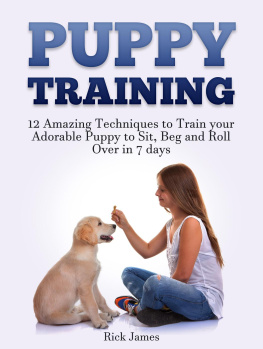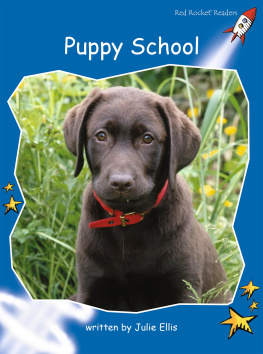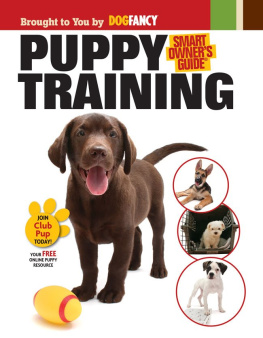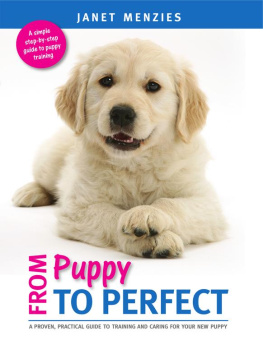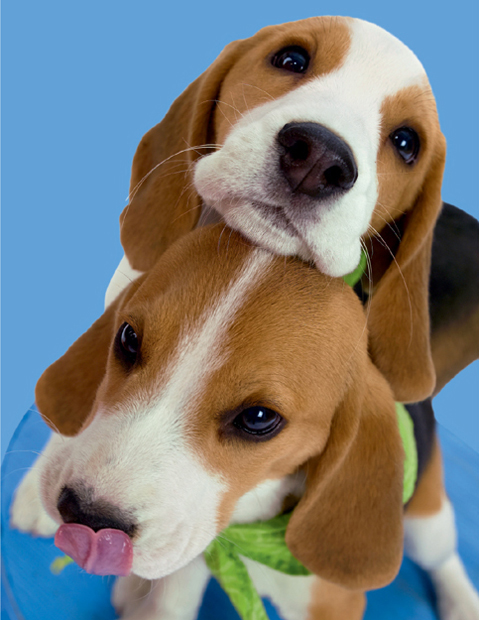
Its my turn now, play with me, I can do it!
51 Puppy Tricks
Step-by-Step Activities
to Engage, Challenge, and
Bond with Your Puppy
Kyra Sundance & Jadie
Photography by Nick Saglimbeni


He is your friend, your partner, your defender, your dog. You are his life, his love, his leader. He will be yours, faithful and true, to the last beat of his heart. You owe it to him to be worthy of such devotion.
Anonymous

Im gonna take a nap now.
CONTENTS


We hope this book inspires you to not only teach tricks, but to Do More With Your Dog!
Kyra Sundance & Jadie
AUTHORS NOTE
When you bring a new puppy into your household, he becomes part of your family. By making the effort to work with your puppy on his first tricks, youre taking a strong step toward developing a closer bond with your dog.
In this book you will use positive training methods to build a joyful relationship with your puppy, where he is a willing partner in the training process. Trick training builds relationships by deepening communication pathways, trust, and mutual respect. It offers a way to bond with your puppy as you strive toward common goals and delight in your successes. The trust and cooperative spirit developed through this process will last a lifetime.
Measure your puppys success not only by the tricks he has learned, but also by improved attention and focus. Not all puppies will learn at the same rate, but remember, hes your puppy and his success need only be measured in your eyes. While its motivating to have a goal of a finished trick, the best thing that comes out of training your puppy is the bond that develops through working together. Dont be so focused on the goal that you miss the joys of the journey!

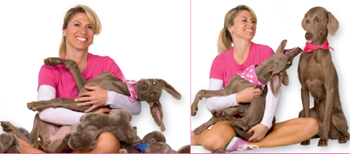

I have so much to do today, I dont know how I can possibly get it all done!
INTRODUCTION
MAKE TRAINING FUN FOR YOUR PUPPY
Teaching tricks to your puppy will increase his intelligence as his brain is challenged to learn new things. Early training will set the tone for how your puppy feels about training in the future, so it is important to keep training fun and rewarding for your puppy.
Dont treat training like a chore or your puppy will associate training, and you, with boredom. Be happy, enthusiastic, and encouraging! Blur the line between play and work by playing a few minutes after every training session.
When your puppy does something right, use your high-pitched happy voice, which is instinctively rewarding for him. Your happy voice should rise in pitch at the end, in a sing-songy tone: good boy!
Dont Show Frustration
Your puppy needs time to learn, and requires many, many consistent repetitions. When teaching him a new trick, your puppy may squirm, paw, and obsess over the treat in your hand. If you feel yourself getting angry or frustrated during a training session, the best thing you can do is to walk away. Your puppy can sense when you are upset, and you wouldnt want him to associate training with your frustration.
Keep Sessions Short
Puppies have short attention spans. Dont train past the point where your puppy has lost interest. Several five-minute sessions per day are ideal for most puppies.
Quit With Him Wanting More
Quit your training session while everyone is having a good time, and before your puppy gets bored or tired. Quit with him wanting more so he looks forward to the next session.
End on a High Note
Keep your puppy feeling good about training by always ending on a successful note, even if you have to go back to an easier step to achieve this. Ask your puppy for a behavior he knows well; praise him excitedly for it; and end the session then.

PUPPY BASICS
HOW OLD IS A PUPPY IN THIS BOOK?
The tricks in this book are intended for puppies eight weeks to two years old. There are no prerequisites for trick training. Young puppies should start with the easy tricks.
HOW LONG DOES IT TAKE TO TRAIN A PUPPY?
The more tricks your puppy learns, the quicker hell pick up new ones. Each trick in this book has a section on what to expect during the learning process. It generally takes a hundred repetitions for a puppy to learn a trick. Different puppies will learn in different ways, and at different speeds, so dont be frustrated if you arent seeing the results you want right away.
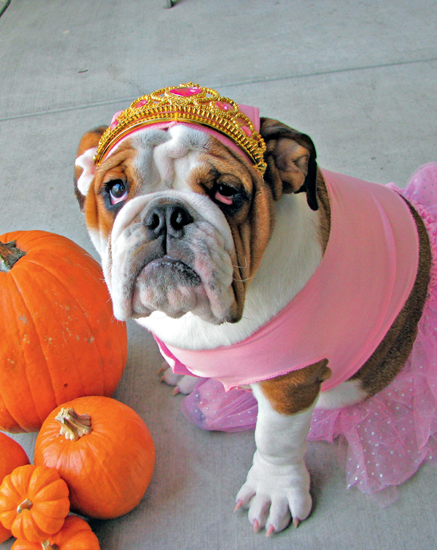
Can we play dress-up?
PUPPIES LEARN THROUGH POSITIVE REINFORCEMENT
Positive reinforcement training methods are the easiest and most effective way to teach a trick to your puppy. Positive reinforcement is the rewarding of good behavior; you get your puppy to do a trick, you give him a reward, and he learns to repeat the trick.
Positive reinforcement methods strengthen the relationship between you and your puppy as you work collaboratively in an encouraging, stress-free and fear-free environment. Your puppy participates in the learning process with a positive attitude, and enjoys working with you. The trust and cooperative spirit developed through positive reinforcement training will last a lifetime.
Treats as Rewards
Although a reward for a puppy can be a toy, play, or praise, we usually use food treat. Treats are a high-value reward that can be dispensed quickly. Keep your puppy extra motivated by using people food treats, such as chicken, steak, cheese, goldfish crackers, noodles, or meatballs. Use pea-sized, soft, tasty treats that your puppy can swallow easily.
Try microwaving hot dog slices on a paper-towel-covered plate for three minutes for a tasty treat!
Reward Success, Ignore the Rest
One of the key skills your puppy develops through trick training is his ability to problem-solve through experimentation. Encourage your puppy to try a lot of behaviors, and let him know (with a treat) which ones were correct.
When a puppy offers a behavior that is not correct, it is best to ignore his unsuccessful attempt rather than punishing it. If you were to say no every time your puppy offered an incorrect behavior, your puppy would become reluctant to try anything at all. Most puppies would rather do nothing than to be wrong.


